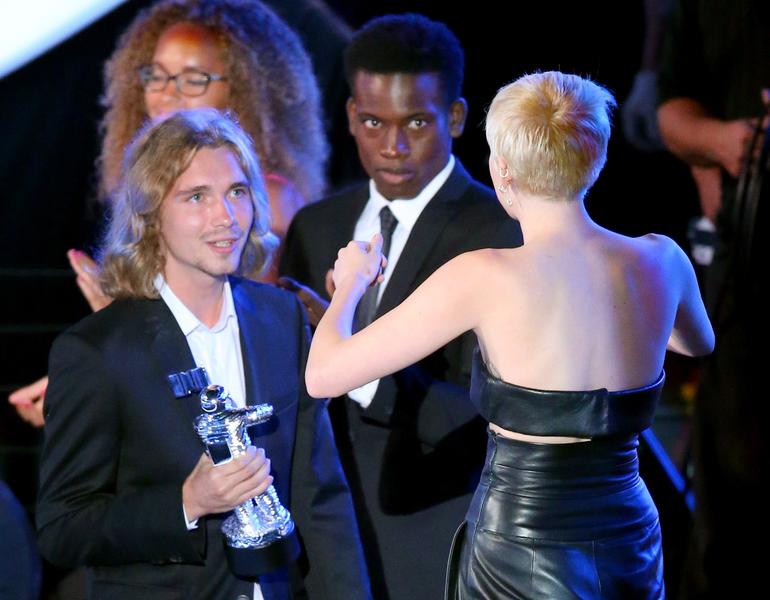MTV Video Music Awards turned curiously serious, thanks to Miley Cyrus and Ferguson


A free daily email with the biggest news stories of the day – and the best features from TheWeek.com
You are now subscribed
Your newsletter sign-up was successful
Sunday night's MTV Video Music Awards had their usual share of red-carpet glamor, onstage antics, unexpected moments — nobody thinks Nicki Minaj purposefully split her dress up the middle in an opening numbers with Ariana Grande and Jessie J — oh, and music. But there were also two uncharacteristically serious moments.
The first one wasn't too much of a surprise — MTV had announced before the show that it would air a 15-second commercial dealing with the protests in Ferguson, Missouri, and it did:

At the awards show, rapper Common also called for a moment of silence for Michael Brown, the unarmed black teenager whose shooting death by a white police officer sparked the Ferguson protests. "Hip hop has always been a voice for the revolution," he said, while presenting the award for best hip hop video, but the protests in Ferguson and around the country are because "each and every one of our lives matter." The moment of silence, he explained, was "for Mike Brown and for peace in this country and in the world."
The Week
Escape your echo chamber. Get the facts behind the news, plus analysis from multiple perspectives.

Sign up for The Week's Free Newsletters
From our morning news briefing to a weekly Good News Newsletter, get the best of The Week delivered directly to your inbox.
From our morning news briefing to a weekly Good News Newsletter, get the best of The Week delivered directly to your inbox.
The genuine surprise of the night was from Miley Cyrus, who instead of accepting her Best Video Award (for "Wrecking Ball") herself, sent up a 22-year-old homeless man from Oregon named Jesse. "I am accepting this award on behalf of the 1.6 million runaways and homeless youth in the United States who are starving and lost and scared for their lives," he said. "I know, because I am one of those people."
Then, noting he's "survived in shelters" all over Los Angeles, Jesse turned his focus to the people in the room: "The music industry will make over $7 billion this year, and outside these doors are 54,000 human beings who have no place to call home." He directed viewers to Cyrus' Facebook page, and her representatives pointed reporters to a fundraising campaign for a L.A. homeless-youth organization called My Friend's Place. The reps said Cyrus got the idea for the stunt from Marlon Brando's 1973 Best Actor Oscar speech, delivered by a Native American woman as a protest against how Hollywood treated American Indians.
A free daily email with the biggest news stories of the day – and the best features from TheWeek.com
Peter has worked as a news and culture writer and editor at The Week since the site's launch in 2008. He covers politics, world affairs, religion and cultural currents. His journalism career began as a copy editor at a financial newswire and has included editorial positions at The New York Times Magazine, Facts on File, and Oregon State University.
-
 A dreamy long weekend on the Amalfi Coast
A dreamy long weekend on the Amalfi CoastThe Week Recommends History, pasta, scenic views – this sun-drenched stretch of Italy’s southern coast has it all
-
 Can foster care overhaul stop ‘exodus’ of carers?
Can foster care overhaul stop ‘exodus’ of carers?Today’s Big Question Government announces plans to modernise ‘broken’ system and recruit more carers, but fostering remains unevenly paid and highly stressful
-
 6 exquisite homes with vast acreage
6 exquisite homes with vast acreageFeature Featuring an off-the-grid contemporary home in New Mexico and lakefront farmhouse in Massachusetts
-
 ‘One Battle After Another’ wins Critics Choice honors
‘One Battle After Another’ wins Critics Choice honorsSpeed Read Paul Thomas Anderson’s latest film, which stars Leonardo DiCaprio, won best picture at the 31st Critics Choice Awards
-
 Son arrested over killing of Rob and Michele Reiner
Son arrested over killing of Rob and Michele ReinerSpeed Read Nick, the 32-year-old son of Hollywood director Rob Reiner, has been booked for the murder of his parents
-
 Rob Reiner, wife dead in ‘apparent homicide’
Rob Reiner, wife dead in ‘apparent homicide’speed read The Reiners, found in their Los Angeles home, ‘had injuries consistent with being stabbed’
-
 Hungary’s Krasznahorkai wins Nobel for literature
Hungary’s Krasznahorkai wins Nobel for literatureSpeed Read László Krasznahorkai is the author of acclaimed novels like ‘The Melancholy of Resistance’ and ‘Satantango’
-
 Primatologist Jane Goodall dies at 91
Primatologist Jane Goodall dies at 91Speed Read She rose to fame following her groundbreaking field research with chimpanzees
-
 Florida erases rainbow crosswalk at Pulse nightclub
Florida erases rainbow crosswalk at Pulse nightclubSpeed Read The colorful crosswalk was outside the former LGBTQ nightclub where 49 people were killed in a 2016 shooting
-
 Trump says Smithsonian too focused on slavery's ills
Trump says Smithsonian too focused on slavery's illsSpeed Read The president would prefer the museum to highlight 'success,' 'brightness' and 'the future'
-
 Trump to host Kennedy Honors for Kiss, Stallone
Trump to host Kennedy Honors for Kiss, StalloneSpeed Read Actor Sylvester Stallone and the glam-rock band Kiss were among those named as this year's inductees
